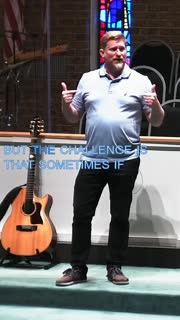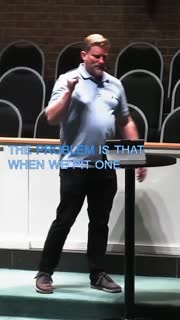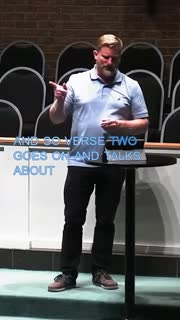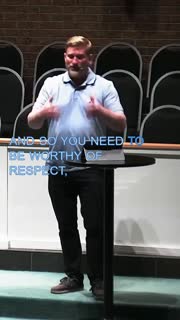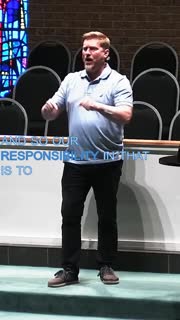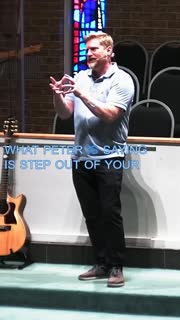Fostering Intergenerational Unity in the Church
Devotional
Sermon Summary
Bible Study Guide
Sermon Clips
1. "And the reason I ask that is because when we look at scripture, when we read 1 Peter, we're seeing this idea that we're not alone. We're seeing this idea that we're supposed to be one people. We're a united people. You know, back in the 1960s and the 1970s, they started coming up with these classifications of generations." [24:13] (19 seconds)
2. "But the challenge is that sometimes if we get caught up in these different silos, we begin to have a disunity between the different generations, a disunity amongst each other. And what we learn in scripture is that we really, part of the body, part of being a believer, is that we're called to be one family. We're actually not Generation X or Generation Z or Millennials. We're actually brothers and sisters in Christ. We are one with the other. We are one body with different parts." [27:23] (38 seconds)
3. "The problem is that when we pit one generation against the other, the body of Christ becomes divided and we struggle actually to flourish in our spiritual growth because we depend on one another. But what we learn in scripture, and Ephesians four tells us this, it teaches us that until we attain unity, we're gonna be tossed to and fro. And instead of building up the body, we grow, instead we're supposed to build up the body. And grow in unity and grow into love." [28:44] (31 seconds)
4. "And so Peter, who is considered an elder of the church, he's talking to other elders. And right off the bat, you're beginning to see this transference from one generation to the next. And so Peter is talking about transferring this general knowledge. And he says, I appeal to you as elders, as witnesses of Christ's suffering, who will also share in the glory to be revealed. He's establishing this hierarchy of yes, there are people called elders who are to speak into your lives and the role of the shepherd is to speak into all the church's lives." [30:47] (36 seconds)
5. "And so verse two goes on and talks about this a little bit. It says, be shepherds of God's flock. Be And all of us are God's flock. And so we have elders who are transferring their wisdom and their knowledge and their relationship with Jesus. They're transferring it from them and they're transferring it down. And we're called to keep watch over the flock, watch over them, care for them." [32:13] (26 seconds)
6. "And if you hold those positions of influence in a church, in our church, you need to do that with very, with a lot of care and a lot of intentionality and understand how important of a role you play in a church and how you can have an impact, whether you know it or not, people are looking up to you. They're watching you to see how you respond. So right off the bat, Psalms 145 is telling us care, care for each other one generation from another." [32:55] (32 seconds)
7. "And so you need to be worthy of respect, self-controlled, sound in faith and in love. and able to endure. But then he turns a little bit in verse 3, and he begins to teach to the older women. You see, it's not just men. It's not just elders. Everybody in the church has a role and responsibility. Back in this time, women didn't quite have as prominent roles in the church. In fact, this is where the church was very revolutionary back in the time of the apostles, because they were empowering women to take on a role of leadership and mentorship in the church." [35:12] (34 seconds)
8. "And so our responsibility in that is to do what? Just to be an example. To live a godly life. To live out that truth. Right? Just like it talks about. Living in sound doctrine. Being self-controlled. Being kind. Being caring. We need to set that example and look for those opportunities. It might be, you know, after, maybe it's not looking to speak the gospel into their lives. Maybe it's just saying, hey, would you like to go to a church? Would you like to go out to lunch sometime? Just to hang out. No strings attached. No hidden agenda. I just want to get to know you. That's what we're called to do, is be an example." [41:59] (37 seconds)
9. "What Peter is saying is step out of your silos. Young people seek out the older people. Seek out elders. Seek out people that can speak into your life. Seek them out and do it with humility. Understanding that you have a lot to learn, that you have a lot to gain, that there's a lot of wisdom that the older generation has for you. And they want to sow into your life, but they don't want, they want to be a gentleman. They don't want to force them. They want to be a gentleman. They want to be a gentleman. They want to be a gentleman." [44:56] (27 seconds)
10. "And so we see this idea that, you know, there's some kind of conditions on how we go about it, but the idea is be willing and be eager and let's live out as an example. One other thing is that an intergenerational church needs to be humble. There needs to be a sense of humility within the church. Ephesians 6 gives us a little bit of idea about that. Let me read the fifth verse of 1 Peter. It says this, in the same way, you who are younger, so we've been talking to the older people, the elders and the shepherds of the church, but Peter does not let the younger people go. He has responsibility for you as well." [02:26:28] (41 seconds)
Ask a question about this sermon
2. "But the challenge is that sometimes if we get caught up in these different silos, we begin to have a disunity between the different generations, a disunity amongst each other. And what we learn in scripture is that we really, part of the body, part of being a believer, is that we're called to be one family. We're actually not Generation X or Generation Z or Millennials. We're actually brothers and sisters in Christ. We are one with the other. We are one body with different parts." [27:23] (38 seconds)
3. "The problem is that when we pit one generation against the other, the body of Christ becomes divided and we struggle actually to flourish in our spiritual growth because we depend on one another. But what we learn in scripture, and Ephesians four tells us this, it teaches us that until we attain unity, we're gonna be tossed to and fro. And instead of building up the body, we grow, instead we're supposed to build up the body. And grow in unity and grow into love." [28:44] (31 seconds)
4. "And so Peter, who is considered an elder of the church, he's talking to other elders. And right off the bat, you're beginning to see this transference from one generation to the next. And so Peter is talking about transferring this general knowledge. And he says, I appeal to you as elders, as witnesses of Christ's suffering, who will also share in the glory to be revealed. He's establishing this hierarchy of yes, there are people called elders who are to speak into your lives and the role of the shepherd is to speak into all the church's lives." [30:47] (36 seconds)
5. "And so verse two goes on and talks about this a little bit. It says, be shepherds of God's flock. Be And all of us are God's flock. And so we have elders who are transferring their wisdom and their knowledge and their relationship with Jesus. They're transferring it from them and they're transferring it down. And we're called to keep watch over the flock, watch over them, care for them." [32:13] (26 seconds)
6. "And if you hold those positions of influence in a church, in our church, you need to do that with very, with a lot of care and a lot of intentionality and understand how important of a role you play in a church and how you can have an impact, whether you know it or not, people are looking up to you. They're watching you to see how you respond. So right off the bat, Psalms 145 is telling us care, care for each other one generation from another." [32:55] (32 seconds)
7. "And so you need to be worthy of respect, self-controlled, sound in faith and in love. and able to endure. But then he turns a little bit in verse 3, and he begins to teach to the older women. You see, it's not just men. It's not just elders. Everybody in the church has a role and responsibility. Back in this time, women didn't quite have as prominent roles in the church. In fact, this is where the church was very revolutionary back in the time of the apostles, because they were empowering women to take on a role of leadership and mentorship in the church." [35:12] (34 seconds)
8. "And so our responsibility in that is to do what? Just to be an example. To live a godly life. To live out that truth. Right? Just like it talks about. Living in sound doctrine. Being self-controlled. Being kind. Being caring. We need to set that example and look for those opportunities. It might be, you know, after, maybe it's not looking to speak the gospel into their lives. Maybe it's just saying, hey, would you like to go to a church? Would you like to go out to lunch sometime? Just to hang out. No strings attached. No hidden agenda. I just want to get to know you. That's what we're called to do, is be an example." [41:59] (37 seconds)
9. "What Peter is saying is step out of your silos. Young people seek out the older people. Seek out elders. Seek out people that can speak into your life. Seek them out and do it with humility. Understanding that you have a lot to learn, that you have a lot to gain, that there's a lot of wisdom that the older generation has for you. And they want to sow into your life, but they don't want, they want to be a gentleman. They don't want to force them. They want to be a gentleman. They want to be a gentleman. They want to be a gentleman." [44:56] (27 seconds)
10. "And so we see this idea that, you know, there's some kind of conditions on how we go about it, but the idea is be willing and be eager and let's live out as an example. One other thing is that an intergenerational church needs to be humble. There needs to be a sense of humility within the church. Ephesians 6 gives us a little bit of idea about that. Let me read the fifth verse of 1 Peter. It says this, in the same way, you who are younger, so we've been talking to the older people, the elders and the shepherds of the church, but Peter does not let the younger people go. He has responsibility for you as well." [02:26:28] (41 seconds)

